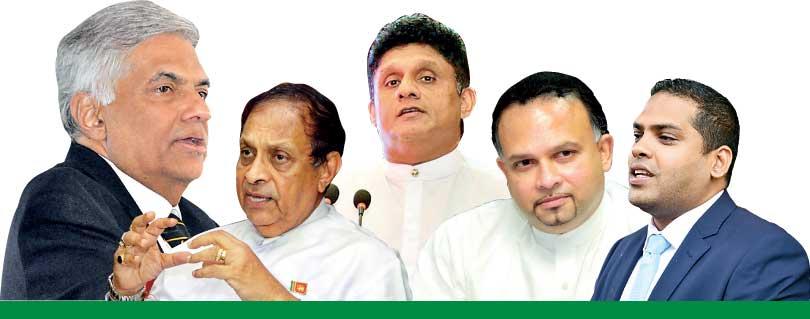Reply To:
Name - Reply Comment

“There is hopeful symbolism in the fact that flags do not wave in a vacuum.’’ ~ Arthur C. Clarke
They say crises are challenges clothed in hard choices. The current crisis in the country, the lack of clear, decisive and unfaltering leadership, more generally in the country and specifically in the United National Party (UNP), is one such challenge clothed in hard choices. That challenge is more to the younger and up and coming second-tier leaders than to the one who is at the helm at this moment in time. Ranil Wickremesinghe’s tenure has been under the microscope for a long time and what appears at the end of the tube does not augur well for a leader of a leading political party that has had more than an average existence among some of the worst political scoundrels in the country.
United National Party’s history shows no dearth of replacement leaders as and when the need arose. Those leaders of yesteryear may have had many deficiencies and may have been found fault in making timely planning and execution of government policies; but they all had tremendous character and poise and unwavering inner strength. That character is usually attributed to many dimensions of human element. Stern upbringing or what one might call breed, formal education which leads to logical reasoning and sound judgment, self-evaluation which is a hard discipline one could ever possess and, of course, inherent strength of self-confidence. When all these elements come together – barring many a psychiatrist’s arguments – a fairly reasonable leader comes into being.
Let us begin at the beginning; When D.S. Senanayake died, as per his wishes, the Governor General at the time, Herwald Ramsbotham, 1st Viscount Soulbury called Dudley Senanayake, DS’ son, to form a new government. However, history has shown us that naming his son as his successor was not only nepotistic, in the context of politics, it was an immoral and a tremendously ill-conceived decision. It was immoral because there were more competent and deserving men around him who had served the UNP in a much more meaningful way. Secondly, it was ill-conceived because Dudley himself was an unwilling player in the game of power politics. By showing sometime before his death that DS wanted his son to succeed him, DS made S.W.R.D. Bandaranaike, one of the most consequential leaders of our country, leave the UNP and form the Sri Lanka Freedom Party (SLFP). That SLFP became the main antagonist of the UNP and Bandaranaike nearly killed it for good in the 1956 general elections.
 Yet, the writer’s argument is that the UNP, even after the departure of SWRD, had within itself, in the wake of the demise of DS, inarguably first-rate talent and those who possessed that talent were not second-tier, but first-tier men. J.R. Jayewardene and Sir John Kotelawala were amongst these men who had enormous inner strength and especially in regard to JR, a vision for the country. Nevertheless, DS was known to be a fair-minded leader. But family hegemony overtakes everything and DS was not spared of this evil human folly.
Yet, the writer’s argument is that the UNP, even after the departure of SWRD, had within itself, in the wake of the demise of DS, inarguably first-rate talent and those who possessed that talent were not second-tier, but first-tier men. J.R. Jayewardene and Sir John Kotelawala were amongst these men who had enormous inner strength and especially in regard to JR, a vision for the country. Nevertheless, DS was known to be a fair-minded leader. But family hegemony overtakes everything and DS was not spared of this evil human folly.
After the defeat of the UNP in ’56, with the virtual departure of Sir John, JR as Sir John’s second-in-command, galvanised the UNP once again. JR as a man-of-the-UNP, until his peaceful death, dominated not only his UNP, but the country’s destiny, right throughout its history. There was no gaping hole in the UNP leadership then.
After JR became the first President of the country, the survival of R. Premadasa and the immediate entry of bright stars like Gamini Dissanayake, Lalith Athulathmudali and Nissanka Wijeratne ensured that the party men and women need not fear of an oncoming vacuum in the event of the departure of the prevailing leader. Gamini and Lalith proved beyond doubt that they were not second-tier but first-rate talent to lead any political party to success.
When JR, just before the ’77 general elections, unofficially made it clear that R. Premadasa was the deputy leader of the party, the UNP once again showed that there did not exist any vacuum of leadership. Not only Ranasinghe Premadasa, both Gamini Dissanayake and Lalith Athulathmudali were immensely qualified and ready to take over the leadership of the party. No gaping hole, no dearth of talent, period.
Alas, the death of all three gentlemen. The leadership of the United National Party passed over by default to Ranil Wickremesinghe. For twenty five years, after being at the helm of this political party that brought independence to the country, the party that introduced the process of free schoolbooks to our children, the party that conceptualised, planned and executed the most stupendous irrigation programme – Accelerated Mahaweli Development Programme – the party that initiated the Mahapola Scholarship Scheme for our undergraduates, the party that built the Gam Udawa Housing Programme, is yet to field a candidate of its own for presidential elections, except in 2005.
What is the second tier of the UNP today? It consists of Karu Jayasuriya, Sajith Premadasa, Navin Dissanayake and perhaps, Harin Fernando. As at present, Karu Jayasuriya is the Speaker of Parliament; Sajith Premadasa is the deputy leader; Navin, National Organiser and Harin Fernando, a Cabinet Minister
The political party that swept the country in 1977 on its own merits and credentials has withered away and is looking for coalition candidates to assure its power within governing ranks. Something has gone wrong somewhere and nobody in the party seems to have realised its gravity and consequently nobody is prepared to address this issue of the ‘gaping vacuum’ inside the party.
What is the second tier of the UNP today? It consists of Karu Jayasuriya, Sajith Premadasa, Navin Dissanayake and perhaps, Harin Fernando. As at present, Karu Jayasuriya is the Speaker of Parliament; Sajith Premadasa is the deputy leader; Navin, National Organiser and Harin Fernando, a Cabinet Minister. Some of the grassroots supporters of the UNP now talk about Sarath Fonseka as a late entry into the second-tier of their beloved party. But they remain essentially second-tier, thanks to the sole occupant of the first-tier, Ranil Wickremesinghe. The vacuum, the hole is gaping; its emptiness is calling for a straight, steadfast and a winning candidate and who amongst the aforementioned second-tier leaders could fill that?
The writer in his previous columns has gone to a fair extent to grade these second-tier leaders; ranking these second-tier leaders is of no use unless it is supported by empirical evidence justifying the different assessment each of these gentlemen is placed in. How each of these candidates fared in the last few election cycles, both presidential and general, is of unique value; its significance cannot be disregarded as non-consequential. A candidate who could not win his electorate, leave alone a district, when the party suffered loss after loss prior to 2015, cannot be trusted as a winner at the next presidential elections. Why? Because he or she has not been able to convert the non-UNP voter to vote for the UNP solely because of his or her stature of candidature. The most glaring example was the 1994 general elections. When the UNP lost the elections, it lost all districts and provinces except the Kandy District and the Central Province. Why, because of Gamini Dissanayake. When the non-UNP voter could not gather strength to vote UNP in other districts and provinces, the Kandy voter viewed through in a different prism; they wanted to vote for Gamini Dissanayake first and the UNP second. Gamini Dissanayake was a winner all the way. Gamini Dissanayake and many enemies, both within and without, but equals none.
Maybe, voters are looking at his son through the same prism. One has to look at the election results and results alone justify the survival of politicians. Which electorate, district and province the UNP won and lost in the last Provincial Council elections will be a reasonable and justifiable guideline. The ‘gaping vacuum’can be filled with the necessary talent and foresight. The writing is on the wall. Yet, those who refuse to see it, don’t see it. That is the real tragedy of the ‘gaping vacuum.’
The writer can be contacted at [email protected]